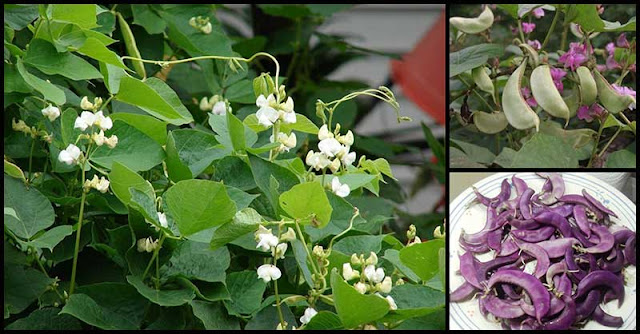Hyacinth bean (Lablab purpureus) is a tropical plant widely grown in Africa and Asia. This twining or trailing herb is also known as Bataw, Lablab bean, Wild Bean, Indian Bean, Tonga Bean, Field Bean, and Egyptian Bean.
The plant is used for vegetable use and is cultivated to be eaten as green or purple pods which are 4 to 5 cm long. It has a sweet flavor and strong nutty aroma. All parts of the plant – leaves, flower, young pods, and beans – are all actually edible.
According to research, this natural ingredient, which is usually grown around trellis or fences can actually give impressive benefits for us.
Nutritional Value
One cup (194 grams) of cooked Hyacinth beans without salt can provide the following:
227 calories
73.56% of copper
111.13% of iron
50.27% of zinc
78 mg of calcium
159 mg of magnesium
15.79 g of protein
233 mg of phosphorus
Hyacinth beans also have vitamins A, B vitamins, and vitamin C. It can help prevent various diseases due to its anti-inflammatory, tonic, aphrodisiac, antimicrobial, antifungal, antispasmodic, appetite suppressants, hypocholesterolemic, and galactagogue properties. Also, its important nutrients, vitamins, minerals, and lipids can significantly improve your overall health.
Health Benefits of Hyacinth Beans
Prevent Cancer
Adequate amounts of zinc can counteract oxidative stress that only increases your risk for developing various diseases. Zinc has anti-inflammatory and antioxidant properties that promote healthy cell division, prevents mutation of cells, and prohibits tumor growth.
Brain Health
The brain pathways, such as dopamine and galactose, need copper to maintain focus, mood, and outlook. A body with a low level of copper may experience low metabolic activity, fatigue, poor mood and trouble in concentrating.
Oral Health
When it comes to bone health, calcium, vitamin D, and phosphorus are essential since they are the ones that support jaw-bone mineral density tooth enamel, and holds teeth in place.
Children are recommended to eat foods rich in calcium and phosphorus, which help form the hard structure of the teeth. Meanwhile, vitamin D reduces gum inflammation that may cause periodontal gum disease.
Reduce Cholesterol
Regularly eating hyacinth beans can help you reduce your body’s level of LDL, thus helping you prevent various diseases such as coronary heart disease.
Improve Cardiovascular Health
With lower levels of bad cholesterol, your cardiovascular health can greatly improve. Take note that a high level of bad cholesterol may cause cardiovascular disease. In addition to this, the vitamin B1 content of Hyacinth beans was found to be able to prevent diseases and treat heart failure.
Ease Asthma
According to a study, hyacinth beans can help reduce certain symptoms of asthma, like nausea. The plant is able to reduce inflammation along the respiratory tract which causes nausea. Aside from this, the plant can also effectively deal with lung problems.
Treats Insomnia
Adequate intake of magnesium helps increase sleep, lower levels of cortisol and higher concentrations of melatonin that are related to stress. Furthermore, research shows that magnesium supplementation reduces symptoms of insomnia and improve sleep efficiency, sleep time, and sleep onset.
Prevent Cramps
Found in Hyacinth beans are an ample amount of potassium that helps reduce muscle cramps and improve muscle strength. Deficiency in potassium can lead to muscle spasms, cramps, and general pain.
Treat Sore Throat
Hyacinth beans have an anti-inflammatory property that works effectively against sore throat. Simply extract the juice from the beans and pods and drink to relieve inflammation. For additional benefits, you can also mix the juice into a lemon water.
Energizing
Ample amount of iron is present in the beans and their curvy pods. Iron has the ability to bring oxygen to the cells and see to it that the whole body is effectively absorbing all the nutrients from the food. With enough amount of iron intake, you can enhance your energy and prevent fatigue.
It’s really amazing that nature gives everything we need. We just don’t have any idea about it. Now that we know about how hyacinth bean can greatly help us, let us start including it into our diet.









